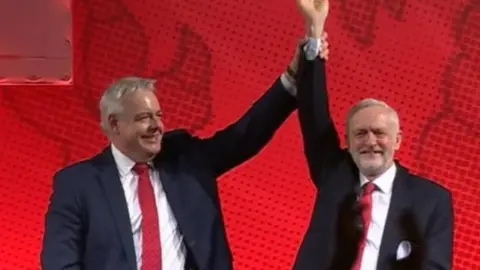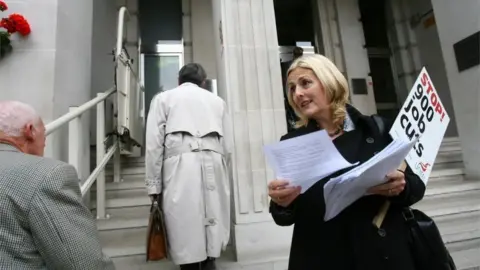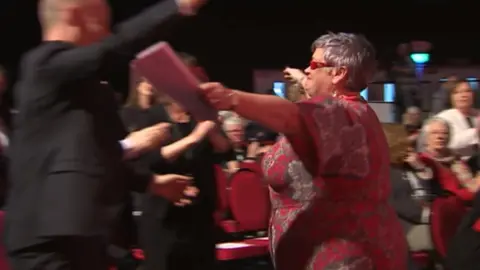Welsh Labour's leader-selection row points to wider struggle
 BBC
BBCThe announcement of a special conference to elect a Labour leader is nothing new - but in Wales the row is over how to elect a new leader, not who to elect.
So in September a conference will be held to decide the rules of the game.
In recent months, sometimes well beneath the radar, there have been tensions over who wields power in Jeremy Corbyn's Labour Party.
The party has indisputably moved to the left - both in policy and in its leading personnel.
Many on the left - such as Jon Lansman, the founder of the Corbyn-supporting campaign group Momentum - have backed a process of shifting power from elected politicians to grassroots members.
But tensions have arisen over how much power should still reside with the party's big financial backers - the unions.
Mr Lansman himself considered standing for the post of the party's most senior official - the general secretary. This, in opposition to a candidate from the country's biggest trade union, Unite.
He later withdrew, telling the BBC he only wanted to ensure there was a "proper process". This was interpreted as code for avoiding a "stitch-up".
 PA
PAAnd union delegates themselves were split over who to back for the post of vice-chair of Labour's ruling national executive only last month.
Simmering tensions came closer to the boil in Wales in April.
The more left wing candidate for deputy leader - Julie Morgan, widow of former first minister of Wales, Rhodri - was defeated by Carolyn Harris at the party's spring conference.
The method of election was an "electoral college" that gave unions and elected politicians two thirds of the vote - while grassroots members had one third.
So although she won more votes overall than her rival, Ms Morgan lost.
While she accepted the rules of the contest, a "one member, one vote" (or OMOV) election would have secured victory.

The rules for electing Labour's UK-wide leader were changed from an electoral college system to a OMOV under former leader Ed Miliband, but it was left up to the national parties in Scotland and Wales whether they would follow suit.
And the current leader and First Minister of Wales, Carwyn Jones, who recently announced he would stand down in the autumn, now seems convinced that party rules need to change to reflect that it is now, in his words "a mass membership party".
Many on the left have been calling for all of the power to be in the hands of the rank and file.
A range of options will now be discussed - though MPs and Welsh assembly members are likely to see their influence diminish.
But four big unions - not including Unite - are fighting hard to retain their say.


In a forthcoming Radio 4 documentary series - The Long March of Corbyn's Labour - we examine both the opportunities and challenges for Labour in having a much expanded membership - two and half times bigger than in 2015.
In an interview for the series, Mike Payne of the GMB union in Wales warned that weakening the union voice in a forthcoming leadership contest could have unintended consequences.
"The trade unions have always been the consistent body within the party that keeps it stable," he said.
"If you take away the voice of organised Labour then the party becomes a mile away from working people on a day to day basis and becomes remote."
And those on the right of the party are concerned that rule changes will make a "Corbynista" successor to Carwyn Jones more likely.
Darren Williams - a left-wing member both of Labour's national executive and its Welsh executive - insists changes are about more than faction-fighting.
In an interview for the forthcoming documentary, he said: "Some of the resistance to a One Member One Vote contest in Wales comes from people who assume that an OMOV system is more likely to favour a left-wing, pro-Corbyn candidate but I think there are arguments just based on which is the more democratic system."
So the decision today to hold a special conference on leadership rule changes - as part of a wider "democracy review" - is, in part, a sign of a changing party.
One where new and different tensions are emerging.
Labour will hope the party will rally around its new leader in Wales. But there is no consensus on how that leader should be elected.
A three part series -The Long March of Corbyn's Labour - will begin on Radio 4 at 20:00 BST on Monday 11 June
